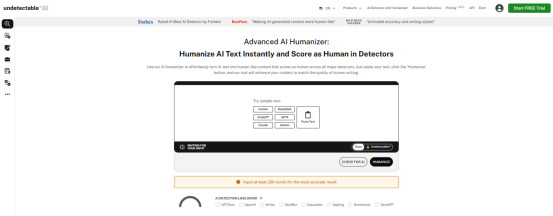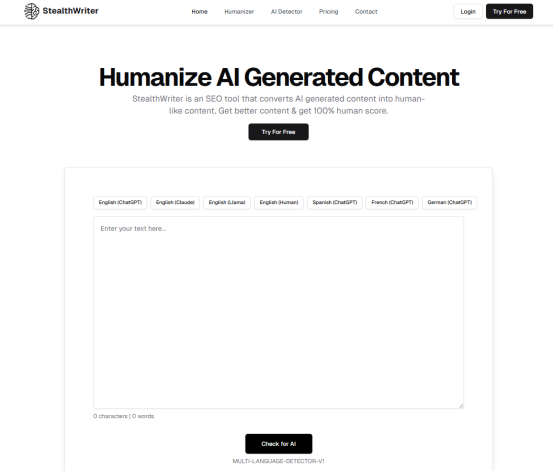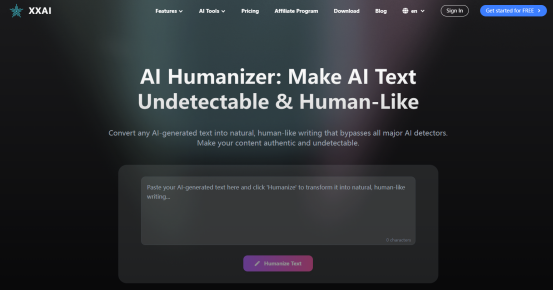My Intimate Experience with AI Humanizer: A Heartfelt Message to Content Creators

Recently, I've become increasingly good at "smelling" AI-written articles. Do you share this feeling? It’s that kind of writing that, although perfect in grammar, logical, and information-rich, always seems to lack a bit of "human touch"—like an infallible robot scholar. Just as I was feeling troubled by this, a new term caught my eye: AI Humanizer. My initial reaction was, "What kind of dark magic is this?" After further exploration, I realized it's practically tailored for those of us who deal with words daily. It can transform stiff AI-generated texts into more natural, fluent, and even add a dash of human emotion and personality.
Today, I want to share my thoughts and experiences with AI Humanizer over this period.
A "Cat-and-Mouse" Game: Why Did I Start Focusing on AI Humanizer?
Since ChatGPT surged in popularity, using AI to generate content has become commonplace. Honestly, its efficiency is astonishing—whether drafting initial versions or gathering information, it has been a great help. Alongside this, AI detection tools have sprung up everywhere. I believe there's a common anxiety behind this: in academia, it’s about avoiding accusations of misconduct; in SEO, it's about preventing penalties from search engines. This demand (or fear) has fueled a huge desire for “anti-detection” tools. AI Humanizer was born amidst this “cat-and-mouse” game. Its initial appeal was often centered on "bypassing AI detection." But what's interesting is that it achieves this by improving content quality—making the text more human-like. This aligns perfectly with Google’s emphasis on “human-centered” high-quality content.
Personal Review: Which AI Humanizer Is Right for You?
Talking without actual practice is pointless. Driven by curiosity, I researched several of the most popular tools on the market. Though I haven't used all of them in-depth, based on their features and reviews, their focus is quite clear and suitable for different audiences.
| Tool Name | Main Features | Best For | Starting Monthly Fee (USD) | Free Plan | Unique Selling Point (USP) |
|---|---|---|---|---|---|
| Undetectable.ai | 8-in-1 AI detector with humanization features | SEO experts & marketers | $19.00 | Free trial available | Integrates multiple leading detectors for cross-verification |
| StealthWriter | Dual models (Ninja and Ghost), built-in detectors, SEO optimization | Content creators & professionals | $20.00 | Yes (300 words per attempt) | Offers two distinct humanization modes: speed and quality |
| QuillBot | All-in-one writing suite (paraphrasing, grammar, plagiarism check), multiple modes | Students & academic researchers | $19.95 | Yes (125 words per attempt) | Academic writing assistance platform |
| XXAI | One-click humanization, style customization | Content creators & students | $9.99 | Free trial available | All-in-one writing platform focused on bypassing detection |
My Personal Insights
- Undetectable.ai: I think of it as a “data analysis hub.” Its greatest feature is the integration of eight mainstream detectors, allowing you to see at a glance the risk levels across different platforms. For someone like me, who needs precise content risk control as an SEO professional, it’s very attractive.

- StealthWriter: This tool feels like an "elite player." It offers "fast" and "precise" modes (Ninja and Ghost) to suit different scenarios. If you produce large amounts of content and need quality control, I recommend trying it out.

- XXAI: In my view, XXAI is more like a "comprehensive writing companion." It’s not just for humanizing text — paraphrasing, grammar checking, citation generation are all included. It’s perfect for students and researchers. It can learn your speaking style to rephrase content, with the main goal of improving writing quality rather than strictly confronting detectors. I see it as a safer choice.

Overall, I believe there is no "best" tool—only the one that fits best. Personally, I’ve gotten used to refining my articles with XXAI. If you don't know which tool to use, ask yourself: what is my core need?
I No Longer Worry About Google SEO
As a content creator, my biggest concern has always been: "Will using this get me banned by Google?" Initially, I was quite worried. But after digging into Google's official guidelines, I realized I was overthinking. Google’s attitude is quite clear: they reward high-quality content, regardless of how it was created. What Google dislikes is large-scale content generation solely aimed at manipulating search rankings — essentially, worthless spam. What they favor are content that demonstrates professionalism, experience, authority, and trustworthiness (E-E-A-T).
Thinking this way, I felt relieved. If I use AI Humanizer to turn a dry AI draft into a more valuable, readable article for readers, it aligns perfectly with Google’s guidelines. So, I believe we should shift our focus from "how to bypass AI detection" to "how to create genuinely valuable content."
Final Reflection: Walking the Moral Line
Of course, I have to admit that using AI Humanizer involves significant moral considerations, especially in academic circles. Turning AI-generated papers into "humanized" works and submitting them as your own is undeniably academic misconduct. However, I also see the other side of the issue: AI detectors are not entirely reliable and can mistakenly flag unique writing styles or non-native English speakers. This puts some students in a dilemma, and they might resort to using humanization tools "for self-protection."
I believe the core issue isn’t the tool itself but the intent behind its use. Tools are neutral. As long as they are used for polishing drafts and enhancing expression, they can be powerful for improving quality. But if they are used to conceal a lack of effort, that becomes deception.
Frequently Asked Questions
How do AI Humanizer tools work?
They use advanced algorithms to rewrite AI-generated content, retaining the original meaning and context while adding natural, human-like elements. Their goal is to boost SEO friendliness and bypass AI detectors.
Who can benefit from using AI Humanizer tools?
They have broad applications — suitable for content creators, marketers, business professionals, students, developers, PR specialists, social media influencers, researchers, bloggers, e-commerce specialists, educators, non-profits, freelance writers, podcasters, legal professionals, HR personnel, creative writers, and anyone with stories to tell.
My Usage Tips and Advice
After exploring these tools, I’ve set some personal guidelines and hope to inspire you:
Treat it as a “polisher,” not a “ghostwriter”:Use AI to brainstorm and plan content, then let AI Humanizer refine tone and fluency. But core points, personal experiences, and fact-checking must be done by me.
Prioritize quality always:My criterion for choosing tools is whether they can make my content better and more engaging, not just whether they can fool machines. And regardless of how powerful a tool is, I always review and modify manually, injecting my own thoughts.
AI Humanizer represents an interesting collaboration between human intelligence and machine efficiency. I think we shouldn’t idolize it nor demonize it. The key is that we, as creators, are always in control of the direction.
Hope my sharing is helpful to you!